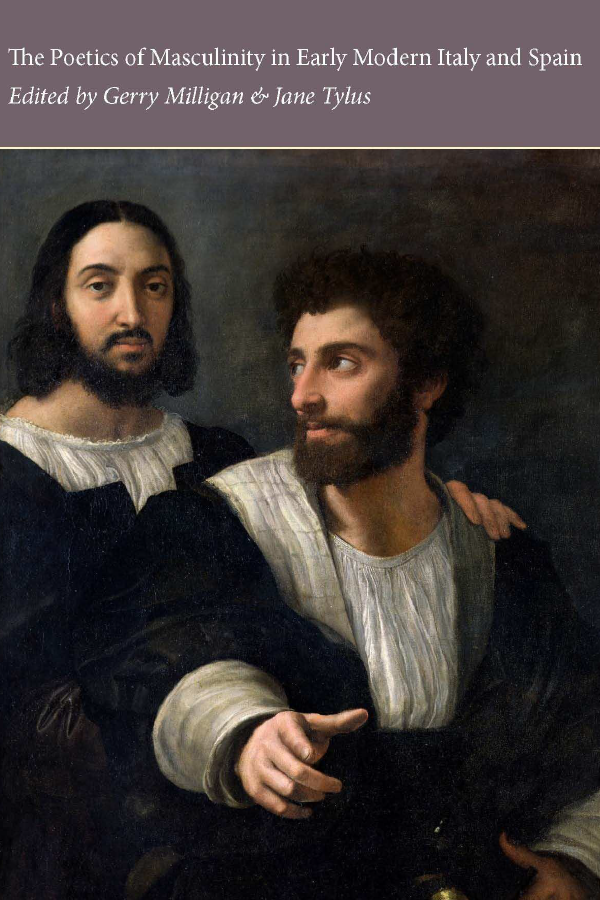The Poetics of Masculinity in Early Modern Italy and Spain
Edited by Gerry Milligan and Jane Tylus - ES22
Overview
“The idea that masculinity has a history is fairly recent. This collection opens new paths in literary and theatre studies by addressing not only how literary texts represented masculinity but how different representational strategies in such texts produce masculinity. They thus offer provocative answers to the question of what it meant to be a “man” on the newly global stage. While the volume as a whole offers a new way of thinking about literary histories, the individual articles offer reflections on the relationship between gendered meanings and the sophisticated, self-conscious, representational form of language that is called literature.
Gerry Milligan teaches at the College of Staten Island-CUNY. He has published several articles on issues of masculinity in the Courtier, Machiavelli, and Gli Ingannati. He is currently finishing a book on gender and war in Italian Renaissance literature.
Jane Tylus teaches at New York University. Her recent work includes Reclaiming Catherine of Siena: Literacy, Literature, and the Signs of Others (Chicago, 2009), and a translation of the complete Poetry of Gaspara Stampa (Chicago, forthcoming).
398 pp.
ISBN: 978-0-7727-2059-7 softcover, 978-0-77272071-9 hardcover
Published: 2010
Contents
Gerry Milligan and Jane Tylus, “Introduction”
1. Gary Cestaro, “Pederastic Insemination, or Dante in the Grammar Classroom”
2. Jane Tylus, “Epic’s Endless Deferral: Vernacular Masculinities in the Florence of Lorenzo de’ Medici”
3. Carla Freccero, “Loving the Other: Masculine Subjectivities in Early Modern Europe”
4. Ian Frederick Moulton, “Castiglione: Love, Power, and Masculinity”
5. Leah Middlebrook, “The Poetics of Modern Masculinity in Sixteenth-Century Spain”
6. Mary-Michelle DeCoste, “Performing Masculinity in the Land of the Man-Killing Women”
7. Gerry Milligan, “Proving Masculinity Before Women: Laura Terracina and Chiara Matraini Writing on Warfare”
8. Marc David Schachter, “‘Quanto concede la guerra’: Epic Masculinity and the Education of Desire in Tasso’s Gerusalemme Liberata”
9. Harry Vélez Quiñones, “‘Templa, pequeño joven, temple brío’: Pretty Boys and Queer Soldiers in Miguel de Cervantes’s Numancia”
10. José A. Rico-Ferrer, “In Earnest and in Jest: Disciplining Masculinity through Narration and Humour in The Spanish Galateo”
11. Dian Fox, “Performing Masculinity, Nationalism, and Honour in Early Modern Spain: Calderón de la Barca’s El pintor de su deshonra”
12. José R. Cartagena-Calderón, “Of Pretty Fops and Spectacular Sodomites: El lindo don Diego and the Performance of Effeminacy in Early Modern Spain”
13. María M. Carrión, “Men with Style. Sprezzatura, Costume, and Movement for Men in the Spanish Comedia”
14. Josiah Blackmore, “Epilogue”
Jessica Goethals, “Index”
Praise
"What is especially innovative about this collection is its success in moving beyond the obvious cultural focus of the topic to consider how literary genre also affected the way masculinity was viewed. Such an approach brings a fresh perspective on current debates about the nature, extent and contemporary meaning of male/male sexual practices in the pre-modern and early modern period.” — Guido Ruggiero, University of Miami
Reviews
Renaissance Quarterly, 64:3 (Fall 2011), pp. 956-957. Reviewed by Eugenia Paulicelli.
Couldn't load pickup availability


